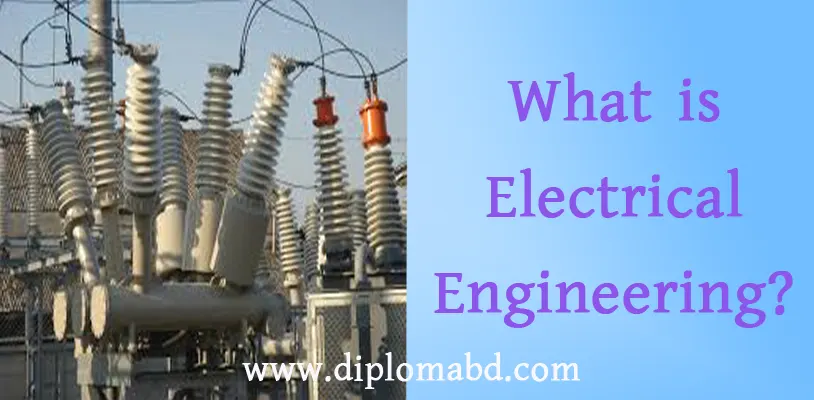Electrical engineering works on a large variety of elements, devices, and systems, from small microchips to large station generators. Here is more about Electrical Engineering.
Table of Contents
What is Electrical Engineering?
Electrical engineering is one of the newer branches of engineering and dates back to the late nineteenth century. it’s the branch of engineering that deals with the technology of electricity.

Early experiments with electricity enclosed primitive batteries and static charges. However, the particular style, construction, and production of helpful devices and systems began with the implementation of Archangel Faraday’s Law of Induction, which basically states that the voltage during a circuit is proportional to the speed of modification within the force field through the circuit. This law applies to the fundamental principles of the electrical generator, the electrical motor, and the electrical device. the appearance of the fashionable age is marked by the introduction of electricity to homes, businesses, and trade, all of which were created attainable by electrical engineers.
Some of the foremost outstanding pioneers in electrical engineering science embody inventor (electric lightweight bulb), artificer (alternating current), electrical engineer (induction motor), Marconi (radio), and Philo T. Farnsworth (television). These innovators turned concepts and ideas concerning electricity into sensible devices and systems that ushered within the trendy age.
What is electrical engineering technology?
Since its early beginnings, the sector of engineering science has grown up and branched out into a variety of specialized classes, together with power generation and transmission systems, motors, batteries, and management systems. Electrical engineering science additionally includes physics, which has itself branched into an excellent bigger variety of subcategories, like frequency (RF) systems, telecommunications, remote sensing, signal process, digital circuits, instrumentation, audio, video, and optoelectronics.
The field of physics was born with the invention of the thermionic vacuum tube diode vacuum tube in 1904 by John Saint Ambrose Fleming. The thermionic valve essentially acts as a current electronic equipment by outputting a multiple of its input current. it had been the muse of all physics, together with radios, TV, and measuring instruments, till the mid-20th century. it had been for the most part supplanted by the semiconductor unit, which was developed in 1947 at AT&T’s Bell Laboratories by William Bradford Shockley, Bardeen, and conductor Brattain, that they received the 1956 honor in physics.
What does an Electrical engineer do?
“Electrical engineers style, develop, take a look at and supervise the producing of electrical instrumentality, like electrical motors, radio detection and ranging and navigation systems, communications systems and power generation instrumentality, states the U.S. Bureau of Labor Statistics. “Electronics engineers style and develop equipment, like broadcast and communications systems — from transportable music players to world positioning systems (GPS).”
If it is a sensible, real-world device that produces, conducts, or uses electricity, all told chance, it absolutely was designed by the associate applied scientist. in addition, engineers might conduct or write the specifications for harmful or nondestructive testing of the performance, dependableness, and long-run sturdiness of devices and elements.
Today’s electrical engineers style electrical devices and systems victimization basic elements like conductors, coils, magnets, batteries, switches, resistors, capacitors, inductors, diodes, and transistors. Nearly all electrical and electronic devices, from the generators at an electrical station to the microprocessors in your phone, use these few basic elements.
Critical skills required in engineering science embody associate in-depth understanding of electrical and electronic theory, arithmetic, and materials. This information permits engineers to style circuits to perform specific functions and meet needs for safety, dependableness, and energy potency, and to predict how they’re going to behave before a hardware style is enforced. Sometimes, though, circuits area units made on “breadboards,” or epitome circuit boards created on laptop numeric controlled (CNC) machines for testing before they’re placed into production.
know What does an Electrical engineer do?
In electrical engineering, Electrical engineers area unit progressively looking forward to packaging (CAD) systems to form schematics and lay out circuits. They conjointly use computers to simulate however electrical devices and systems can operate. laptop simulations will be accustomed to modeling a national power system or a microprocessor; so, proficiency with computers is important for electrical engineers. additionally to dashing up the method of drafting schematics, computer circuit board (PCB) layouts, and blueprints for electrical and electronic devices, CAD systems allow fast and simple modifications of styles and speedy prototyping victimization CNC machines. A comprehensive list of necessary skills and talents for electrical and physics engineers will be found at diplomabd.com








